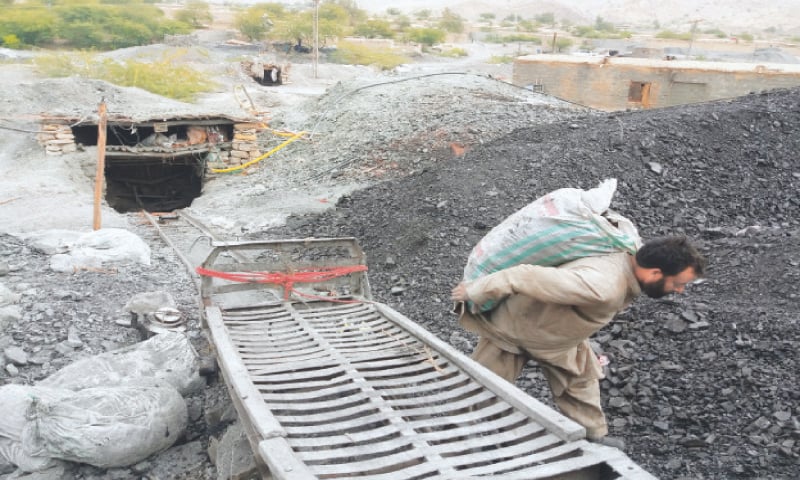THE weather in Mach town of Balochistan’s Bolan district was pleasant on Saturday morning, but it then started raining.
Mach, a coal mining town, wears a dusty, disheveled look. Everybody is linked to the coalmine business one way or the other.
Across the road and river leading to the town, work is under way in mines. But fear is in the air after the March 12 accident in which seven miners died.
But nobody seems to be overly bothered, including the coalminers themselves. Dilbar Khan Swati is one of them.
Swati, as his last name suggests, hails from Swat. He has been working as a coalminer for over 15 years.
The harsh working conditions inside a coalmine have not taken away the smile from his bearded face.
In past year alone, 102 coalminers have lost their lives in Balochistan in 72 accidents
He currently works as a haulage man. Through a trolley, he pulls up white sacks filled with coal outside the mine.
I am headed to Al Madan Coal Company to meet him.
As soon as we reach the place, the bell rings thrice. It means he has to pull the trolley, on the track, going down 500 feet.
“If the bell rings five times, then it is the emergency alarm,” Dilbar says with a grin on his face.
He is seated in the driving seat of the trolley in a small, open room over the top of the mine.
There is a telephone on the roof of his driving seat. Pointing to the phone, he adds: “If there is an emergency, they can telephone me too.”
Dilbar’s luck, unlike that of his co-workers, has not run out. Instead, he sees himself as extremely lucky after the explosion in Marwar coalmine that claimed the lives of seven miners recently.
“Although it could have been us in the very next coalmine, I have never given it a thought as mining is my only livelihood.”
On March 12, six coalminers were found dead in Marwar area where Dilbar had worked. It was followed by the death of seven miners in Harnai who burnt to death after a blast.
In the past year alone, 102 coalminers have lost their lives in Balochistan in 72 accidents, according to Sultan Muhammad Lala, who heads the Balochistan Coal Mines Workers Federation.
Ten miners are working deep down the ground and they extract 1,000-1,200 tonnes of coal in a day. But what catches my attention is the presence of Gul Hasan, a 10-year-old boy who works as a mutkuli (a worker who separates clay from coal) at the mine.
“Since my father has gone to Raiwind on a chilla (a 40-day period of preaching), I am working here,” he told Dawn.
“I get 2,000 rupees per week. And I have not been to a school.”
Like Gul Hasan, there are children working at other mines, too.
Excessive mining
Background interviews suggest most of the deaths occur due to over-mining. Mach, like other mining towns, is a witness.
I travelled to Killi Sardar Satakzai, a village situated along the Bolan River. The residents of Killi Satakzai are haunted by one fear these days: cracks have appeared in the earth and houses of these residents due to excessive mining. The village wears the look of a place devastated by an earthquake.
Over the last three years, work has been going on over 100 coalmines in the area.
Yar Mohammad Baloch, who is in his 80s, has been a coalminer for over three decades. He can no longer work because of old age.
He cannot remember the names of all his grandchildren, who live with him.
“Miners are working in three shifts so that they extract as much coal as possible because they fear the government could order an indefinite suspension of mining any time due to the harm it has caused to the place,” he said.
Outside the main bazaar, the mines department’s building stands. Although there is a lock hanging at the main gate, it is open. There are two office-bearers in the main office.
One of them says the department has not allowed mining beside the Bolan River and areas nearby.
According to him, government records show no mining is allowed in the area as the precarious state of the mines constitutes a threat to workers’ lives. “But mine owners and workers pay no heed to government directives, even after the imposition of fines.”
Inspector Jumma Khan puts a straightforward question: “Do you have enough technical knowledge to understand the hazardous conditions in which coalminers work?”
I reply that since I have done a number of stories on the subject, I am a “semi-technical hand”.
He hits back in technical jargon: “The coal mines have gone deep down 3,000 feet. That is why accidents occur frequently.”
‘We are nobody in Quetta’
Mach has a Hazara mohalla too, but most of the residents have left the place to escape sectarian violence. Only two households remain now.
A recent slaughter of 10 Hazara coalminers by the militant Islamic State group in Gishteri mountains of Mach led to the closure of coalmines, but work has resumed now.
One of the Hazara families I spoke to told me they would never leave their place of birth. “We have been living here for three generations. Our ancestors settled here to work at coalmines,” one of them said.
“I speak Brahui fluently,” he tells me. “The locals respect us more than they respect their own and most of them know us.”
In reply to a question as to why they do not want to go to Quetta to live with other Hazaras, he said: “We are like one big family here, whereas we’d be nobody in Quetta.”
Published in Dawn, March 24th, 2021














































